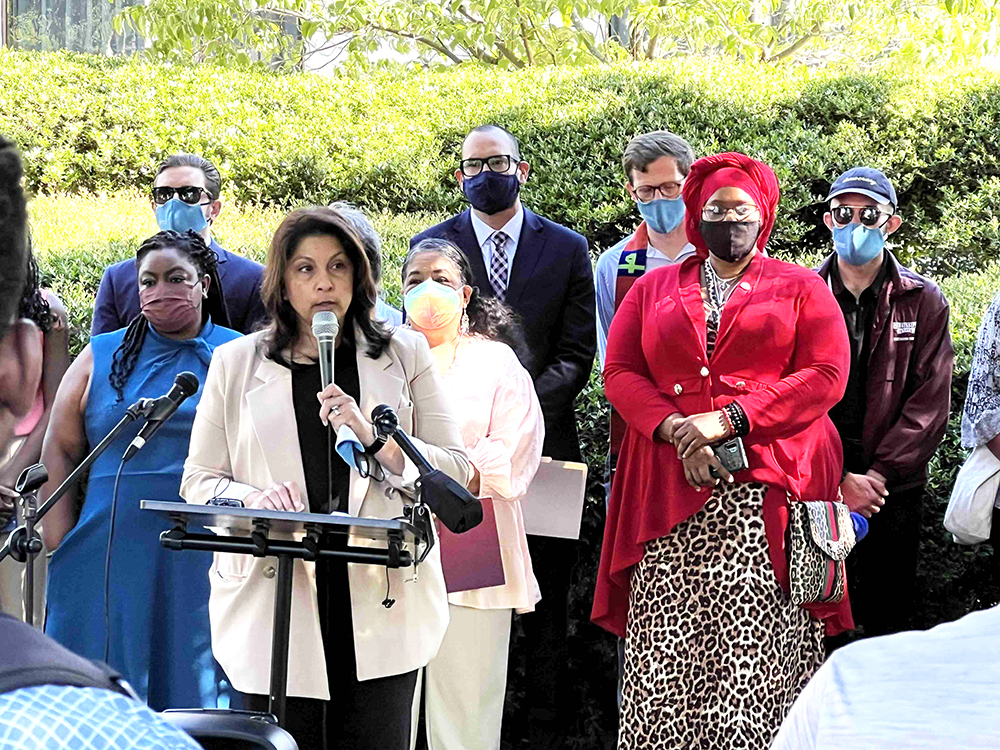By: Jordan Meadows (Staff Writer)
After weeks of heated debate and deliberation, North Carolina’s GOP lawmakers have unveiled a compromise bill addressing public masking and protest regulations. Originally proposed by Senate Republicans as amendments to an existing House bill, the legislation aims to tackle concerns surrounding mask use, particularly in the context of public safety and protests.
The proposed changes stem from assertions by Republicans regarding instances of mask misuse, including concealing identities during public protests and committing crimes. While North Carolina has long-standing laws against public masking dating back to the 1950s – created for Ku Klux Klan members – exceptions were introduced during the pandemic, allowing mask use for health and safety reasons. However, a recent Senate proposal sought to repeal this exception, drawing widespread criticism, particularly from individuals reliant on masks for health reasons.
In response to the backlash, a conference committee composed of House and Senate Republicans revised the bill. The resulting legislation maintains an exception for health-related mask use but significantly narrows its scope. It stipulates that only “medical or surgical grade” masks are permissible for preventing the spread of contagious diseases, omitting broader language present in the previous exception.
Key provisions of the bill include empowering law enforcement to request the removal of masks for identification purposes and allowing property owners to demand temporary unmasking of individuals on their premises. Critics have raised concerns about the potential abuse of this provision, particularly regarding racial profiling.
Cheryl Carter, Co-Executive Director of Democracy NC, expressed concern about the provision allowing anyone to request mask removal. Highlighting her personal health challenges, Carter, who suffers from asthma and chronic bronchitis, said she needed to wear masks outdoors due to her susceptibility to frequent upper respiratory infections.
“Any amount of time without a mask puts me at risk,” Carter explained. “Why are we giving that power [to law enforcement] and asking law enforcement officers to yet do one more thing in their job? Why are we saying that a manager in Walmart can look at me and say, ‘I don’t recognize you, I feel threatened and need you to drop your mask’?”
Additionally, the bill introduces sentencing enhancements for those using masks to conceal their identity while committing crimes and imposes stricter penalties for participating in protests that obstruct traffic.
Protestors who block traffic will be held liable for the injuries and deaths of people who they block from receiving medical care by paramedics in ambulances. Critics view these measures as curbing constitutional rights to protest, especially in light of recent demonstrations on college campuses regarding the Israel-Hamas war.
“House Bill 237 is a blatant attempt to retaliate against protesters who are exercising their right to protest at the expense of historically marginalized communities,” said Shruti Parikh with North Carolina Asian Americans Together.
“The timing of this bill is no coincidence. It’s a clear retaliation against protesters on our college campuses who spoke up against the genocide in Gaza,” Parikh said.
Opponents, including advocacy groups and Democratic lawmakers, argue that the bill’s provisions are overly restrictive and could disproportionately impact marginalized communities. They also condemn last-minute additions to the bill, such as changes to state campaign finance laws, which they perceive as attempts to undermine transparency and accountability in elections.
Speaking out against the bill, advocates from various organizations convened a press conference outside the North Carolina Legislative Building on Tuesday morning, denouncing its implications for masking rights, protest freedoms, and campaign finance regulations. They accuse GOP lawmakers of using the bill to suppress dissent and consolidate power.
“We now celebrate the stories of the powerful, racial justice protests of the 1960s, like the iconic 1965 march that blocked traffic and occupied the full length of the bridge in Selma, Alabama,” said a member of the NAACP-NC whose name could not immediately be verified. “When people used to protest by not giving up their seats on buses, trains, and lunch counters. Civil disobedience has always been one of the country’s political traditions, what’s new is the effort to impose harsher penalties on protesters.”
Dawn Blagrove, the Executive Director of Emancipate NC, said that the bill takes away the constitutional right to protest and that there are legislators who are frightened by the power of protest.
“When you’re afraid of the people, you’re afraid of their power. When you’re afraid of their power, you’re afraid of democracy,” Blagrove said.
The fate of the bill now rests with the North Carolina House, with a final vote expected soon. However, Governor Roy Cooper is anticipated to veto the legislation, setting the stage for potential override votes in both chambers and prolonging the contentious debate over masking rights and protest restrictions in the state.
“I smell politics on the other side of the aisle when they’re scaring people to death about a bill that is only going to criminalize people who are trying to hide their identity so they can do something wrong,” Wilson County Republican Sen. Buck Newton, who presented the bill, said on the Senate floor.

